Published
2 years agoon
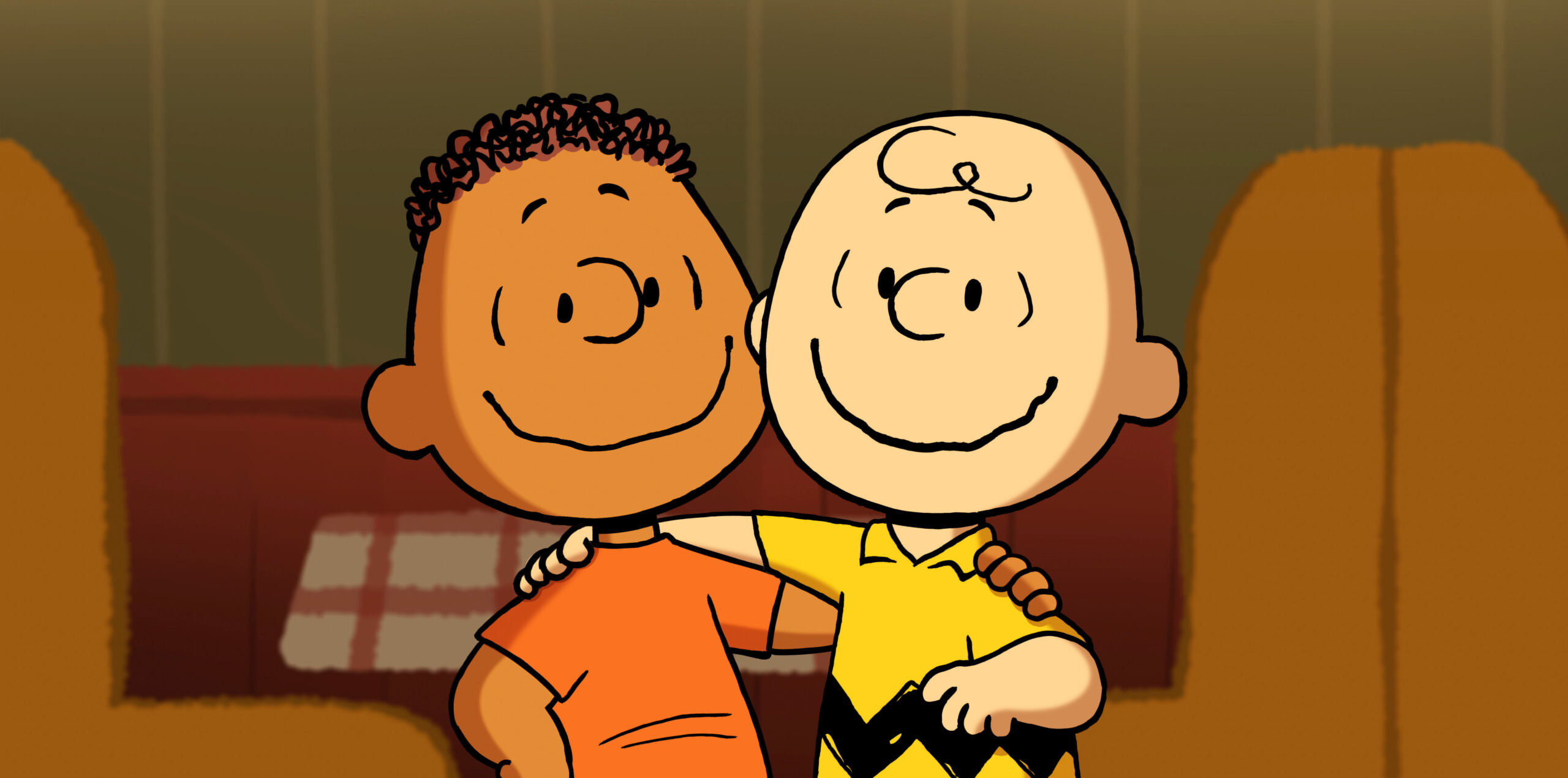
Franklin Armstrong and Charlie Brown in “Snoopy Presents: Welcome Home, Franklin,” premiering February 16, 2024 on Apple TV+.
THE NATURAL ARISTOCRAT (NIR REGEV): I wanna start off by mentioning a talk that Robb had about six years ago at The Indianapolis Public Library. Robb was talking about the first time he met Charles (Schulz) at his house and how that house later burned down, but that his work will never burn.
That the legacy will always remain no matter what happens to property and so forth. I was wondering, especially because he lent Franklin that Armstrong name, what it means to you guys to carry on the Peanuts legacy?
ROBB ARMSTRONG: It was devastating when the fire happened. Well, first of all, I’m very close to the Schulz family. Jeanie Schulz, Charles Schulz’s widow is a friend of mine.
Sparky Schulz was a friend of mine. Craig is a friend of mine. Brian’s a friend of mine. I hear about a fire breaking out in Santa Rosa. I’m thinking right away. I hope it doesn’t hit the Schulz family… And it does.
It was just absolutely unthinkable. I’m hoping nothing happens to Jeanie and nothing did… Nothing physical anyway.
But she was hurt in a kind of emotional way, maybe even, spiritual way by that fire. It was devastating. I’ve been to the new place and it’s very nice too. But there was something about Sparky having been at the old place.
It was something about his presence there. His spirit was there. And I’ll never forget walking in and seeing he had a framed original of mine sitting next to his favorite chair. And it’s gone.
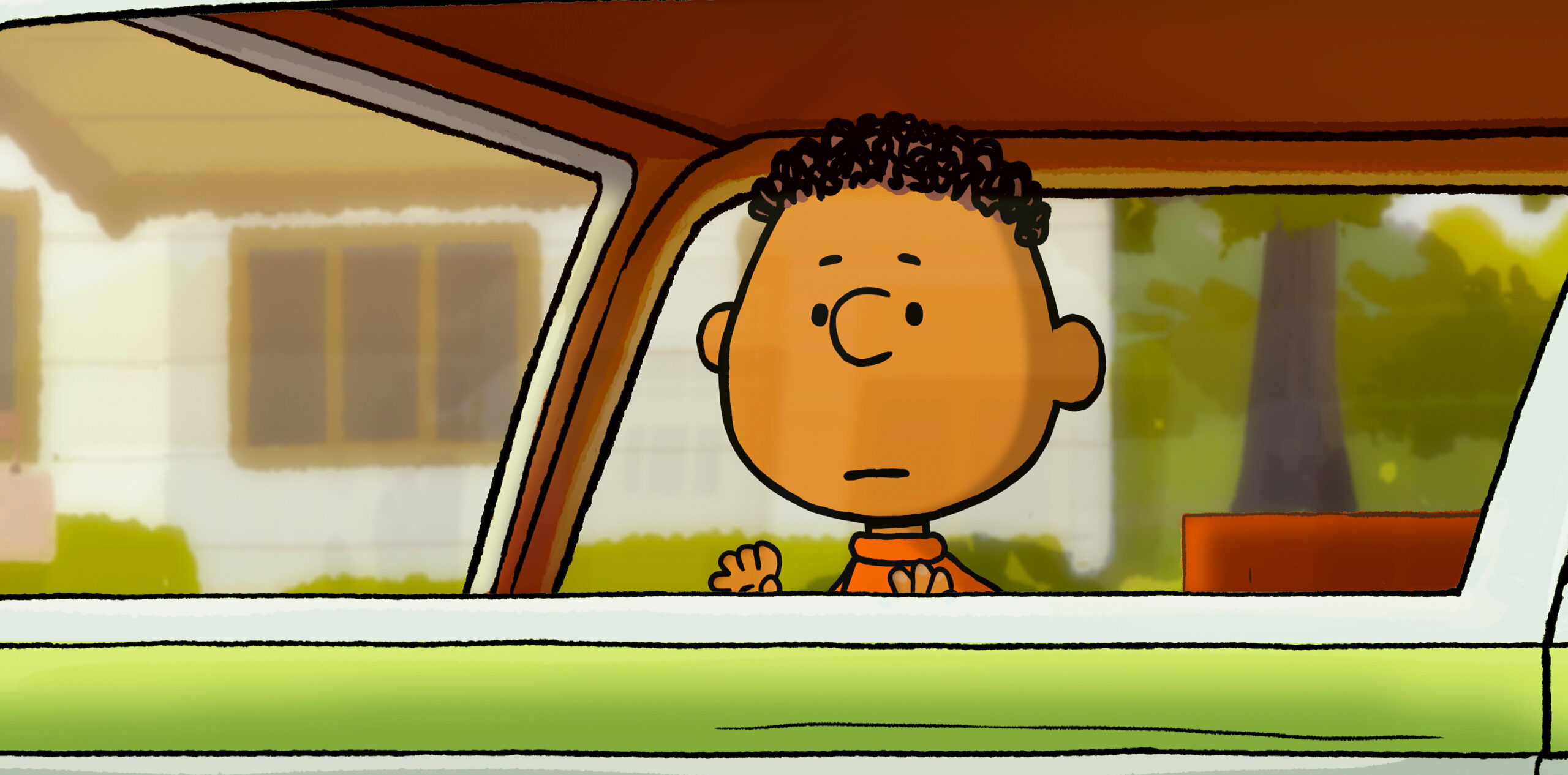
Franklin Armstrong in “Snoopy Presents: Welcome Home, Franklin,” premiering February 16, 2024 on Apple TV+.
I mean, I’m about to bust out crying. It’s gone. It is gone. But it’s not gone. He’s not gone.
Sparky Schulz has gained that rarest of things called immortality, Peanuts can’t be destroyed.
Most devastating fire in that part of the country’s history did not destroy his legacy. Just some paper, just some things.
And his widow was not hurt. I had to get over all my fear and anxiety when that thing hit. I realized how much went up in smoke.
We’re talking about a lot of stuff, but I had to get over it. She was protected. His legacy will always be protected because we are carrying it forward.
This Peanuts special, this Franklin special is keeping alive the immortal Sparky Schulz more than it’s a story about one of his characters.
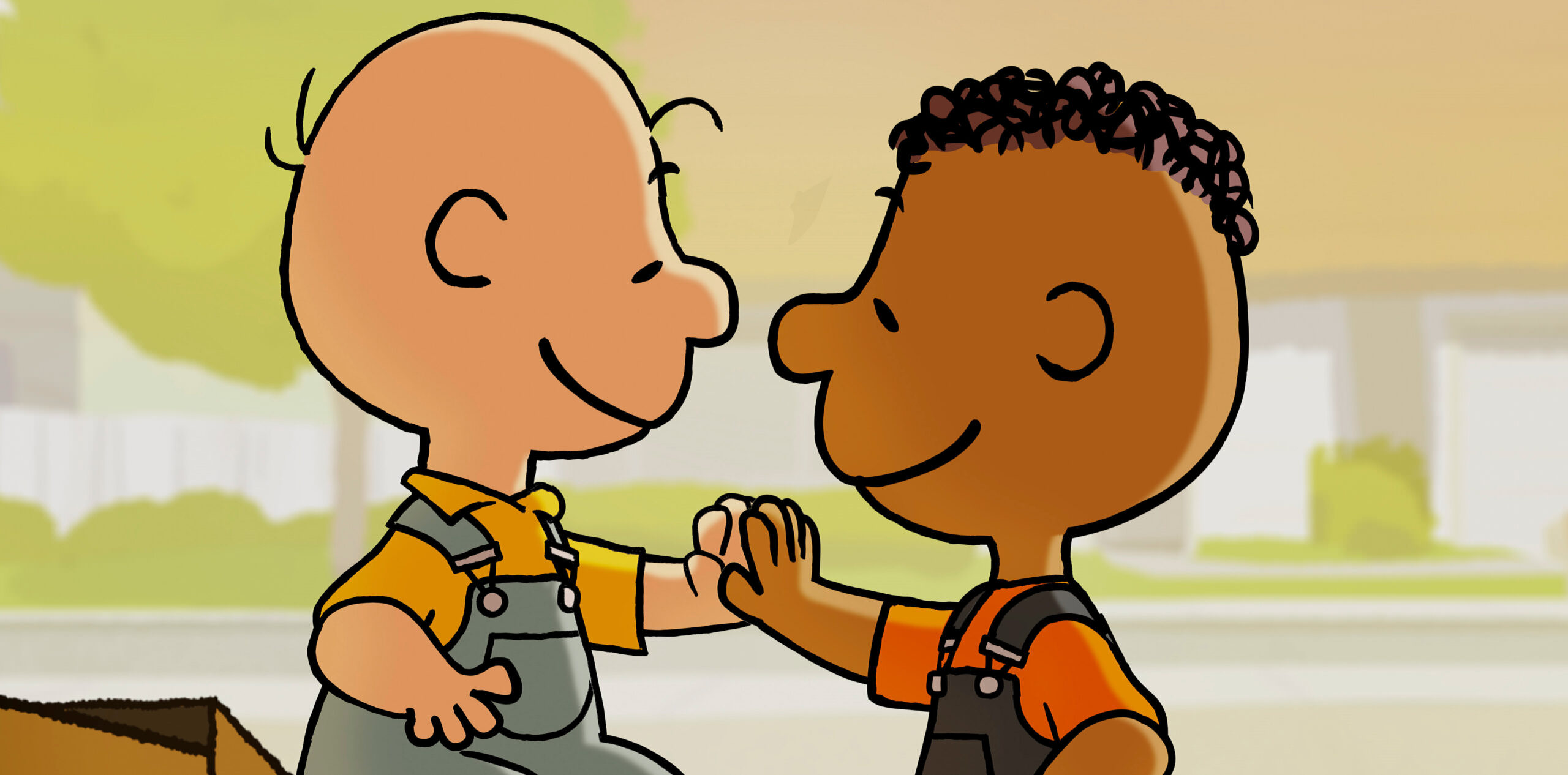
Charlie Brown and Franklin Armstrong in “Snoopy Presents: Welcome Home, Franklin,” premiering February 16, 2024 on Apple TV+.
THE NATURAL ARISTOCRAT: I found it really interesting how much the film really adheres to the original comic strips. They meet at the beach the same way and so forth. Essentially, filling in the gaps in-between the comic strips through the film.
CRAIG SCHULZ: Well, I think you have to hypothesize where he would’ve gone with a character had he had enough room to kind of run with it within the comic strip… Which you already don’t have. We only got four boxes.
You can only do so much and it was laid upon us to already examine what we would’ve interpreted. What my dad would’ve interpreted as Franklin’s journey from the inner city to what we hypothesize as the Peanuts neighborhood somewhere in the Midwest.
And we did that by exploring different ways. Then you had to take it upon yourself to explore how would these two kids come together? What is gonna bring two strange kids together and bond them? And we had discussions about them building a tree fort together, doing some other kind of project together.
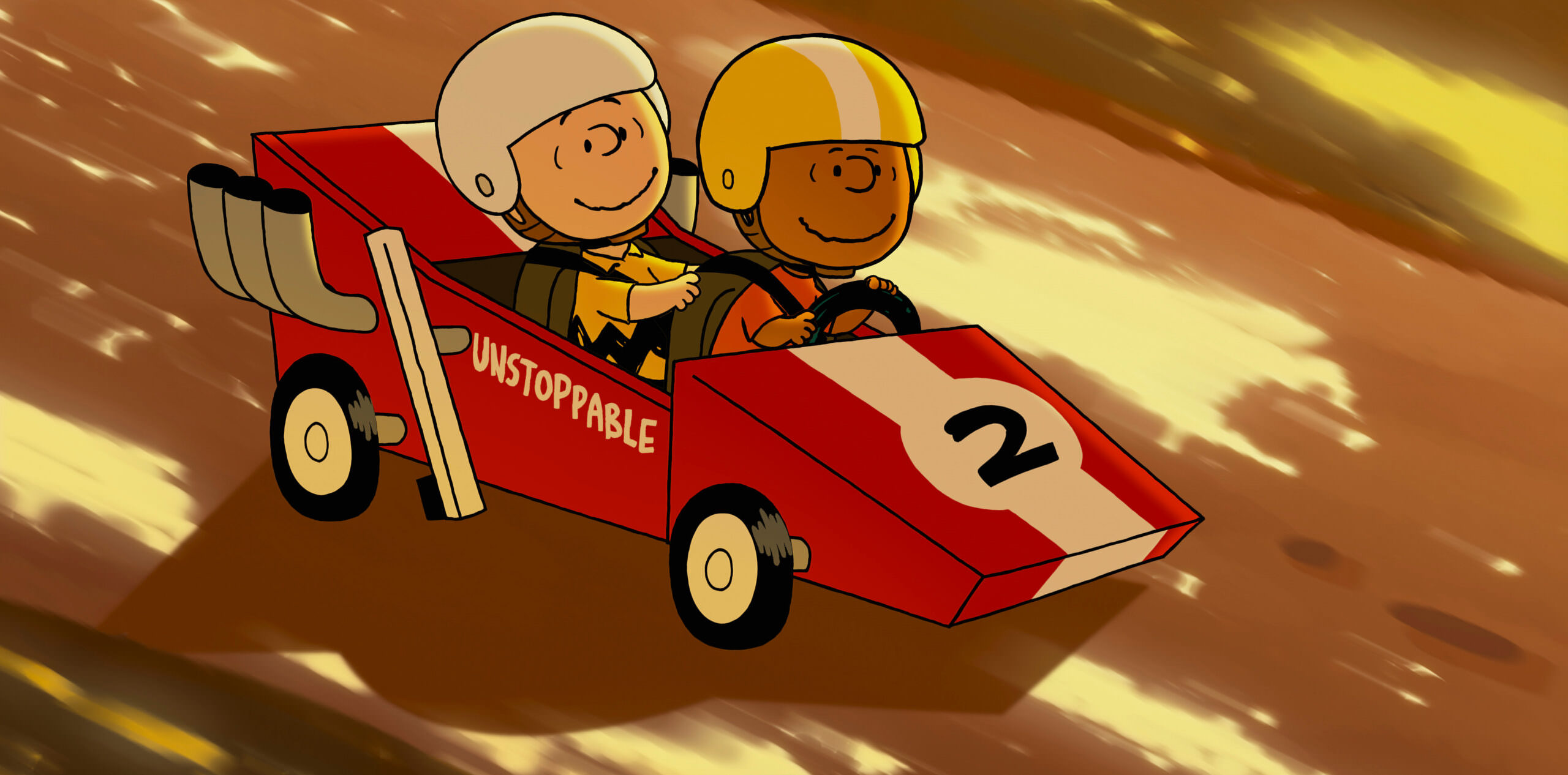
Charlie Brown and Franklin Armstrong in “Snoopy Presents: Welcome Home, Franklin,” premiering February 16, 2024 on Apple TV+.
And then we hit upon the soapbox derby, which is sort of universal, especially to the Midwest and so forth. How that would bring them together at sort of a neutral place. And within that journey, they would discover who each of them are and go and build upon that relationship.
THE NATURAL ARISTOCRAT: Midway through the movie, there’s a line Franklin says “The lemonade girl was right about you!”. I found it to be really interesting because on one side everyone’s open and positive when things are going right.
But the moment a friendship or relationship is slightly stressed, people have a tendency to drop back to their preconceived negative notions and stereotypes about each other. Why do you think that is?
I found this moment to be a high point, the best scene overall of the movie in my opinion.
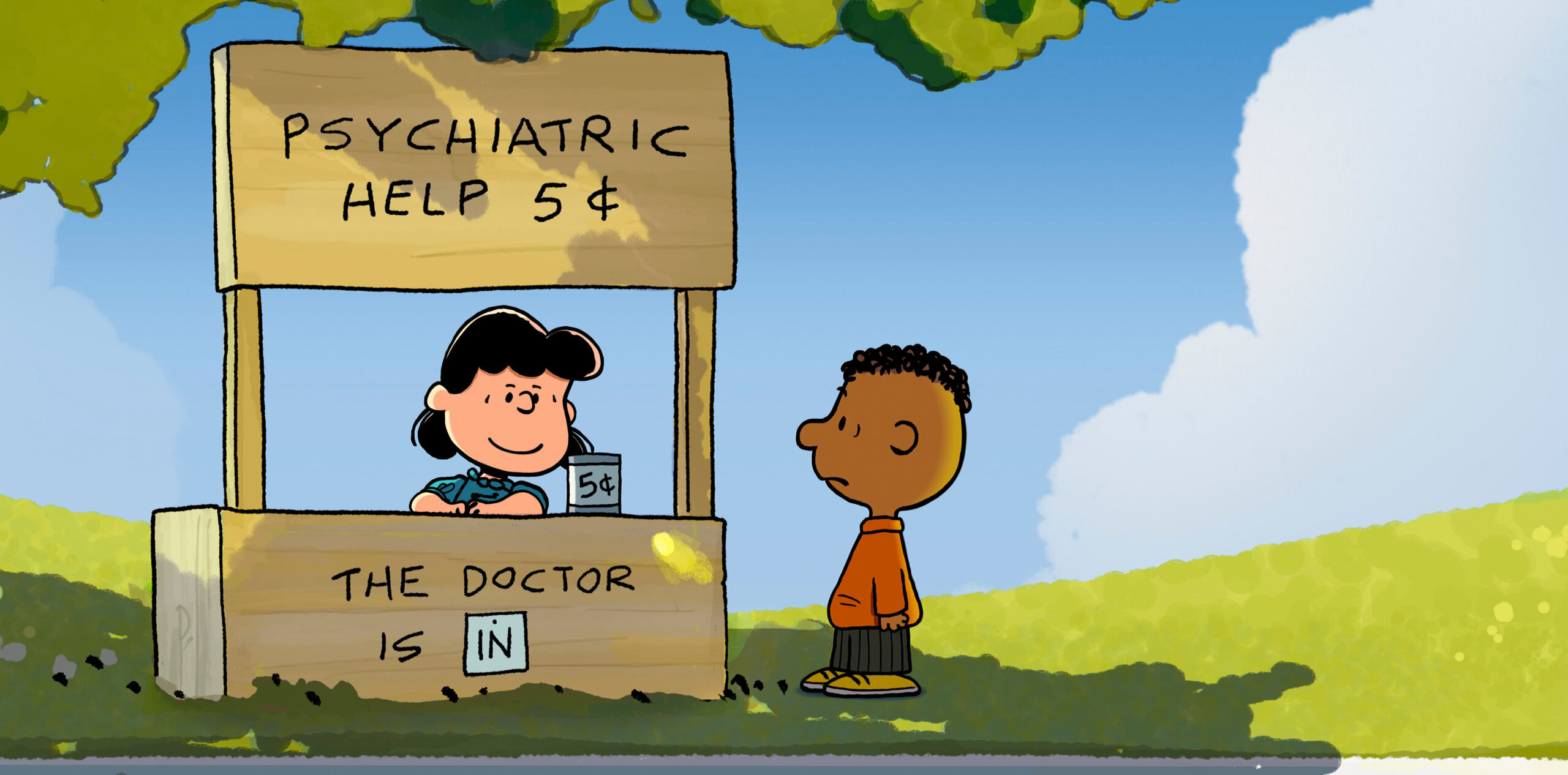
Lucy and Franklin Armstrong in “Snoopy Presents: Welcome Home, Franklin,” premiering February 16, 2024 on Apple TV+.
CRAIG SCHULZ: I think what’s interesting in the film is that, number one, as the viewing audience, most of us know what each of the characters are about in their background stories.
So for me, when Franklin refers to Lucy as the Lemonade Girl, number one, I thought that was a very funny line he came up with and it continued throughout. He doesn’t call her Lucy, she’s the Lemonade girl (laughs).
But, again, he doesn’t know any of the characters. So he comes in basically almost blind, you know, and he can accept them for who they are at that moment in time.
Especially Charlie Brown, because Charlie Brown has this whole history that he doesn’t know about. So he is very accepting of Charlie Brown.
He is very accepting of everybody else, even when they act kind of strange. Like when he meets Linus and it’s a kid with a blanket sitting in a pumpkin patch. He sees a dog on top of his own doghouse and then a girl sitting in a psychiatric booth that he doesn’t quite understand.
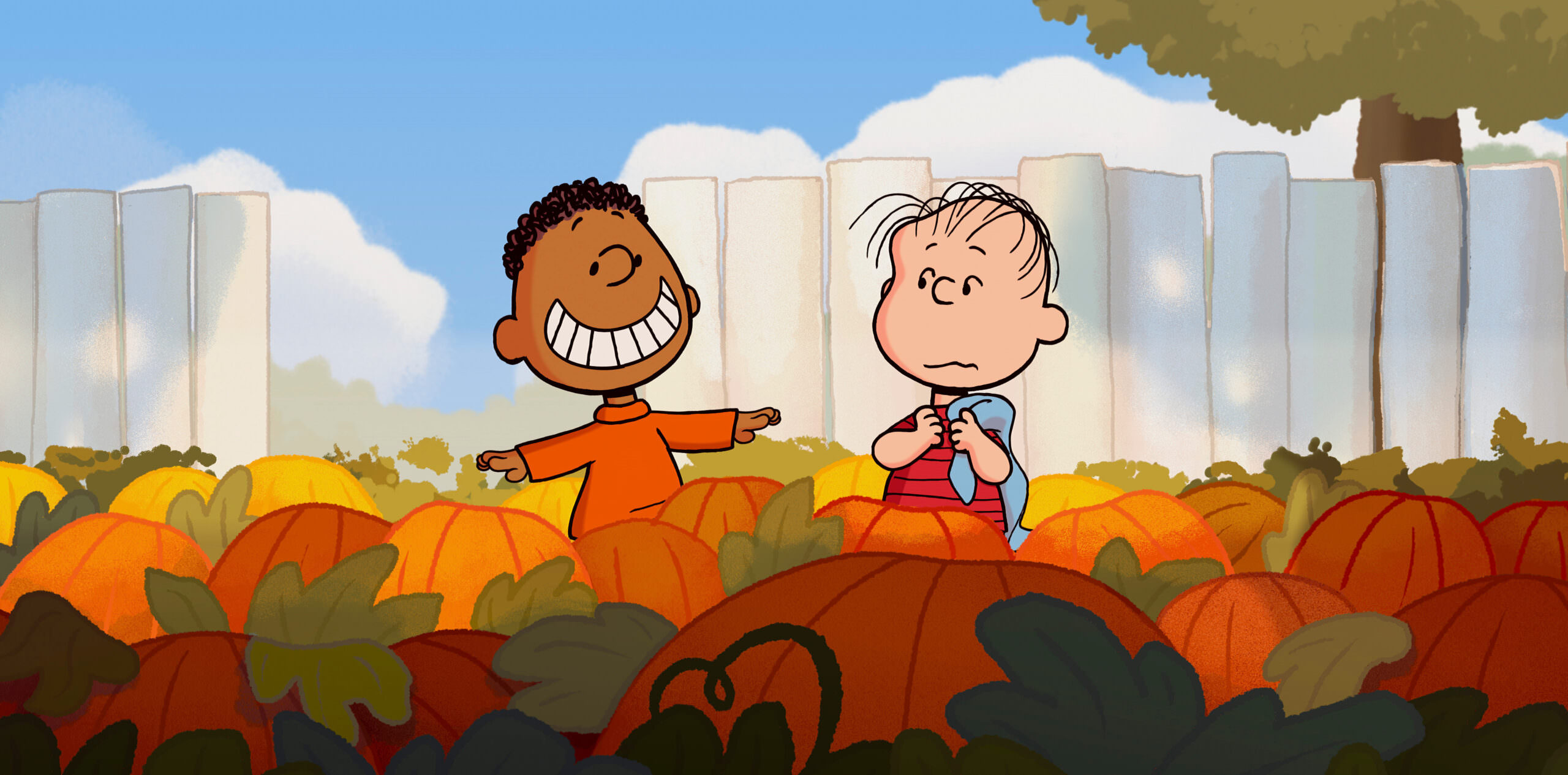
Franklin Armstrong and Linus in “Snoopy Presents: Welcome Home, Franklin,” premiering February 16, 2024 on Apple TV+.
And yet he accepts ’em all for who they are. And that’s, I think what the world really needs, to be more accepting, not judging everybody.
‘Cause if you just came in and started judging all these kids, you would turn and run that moment.
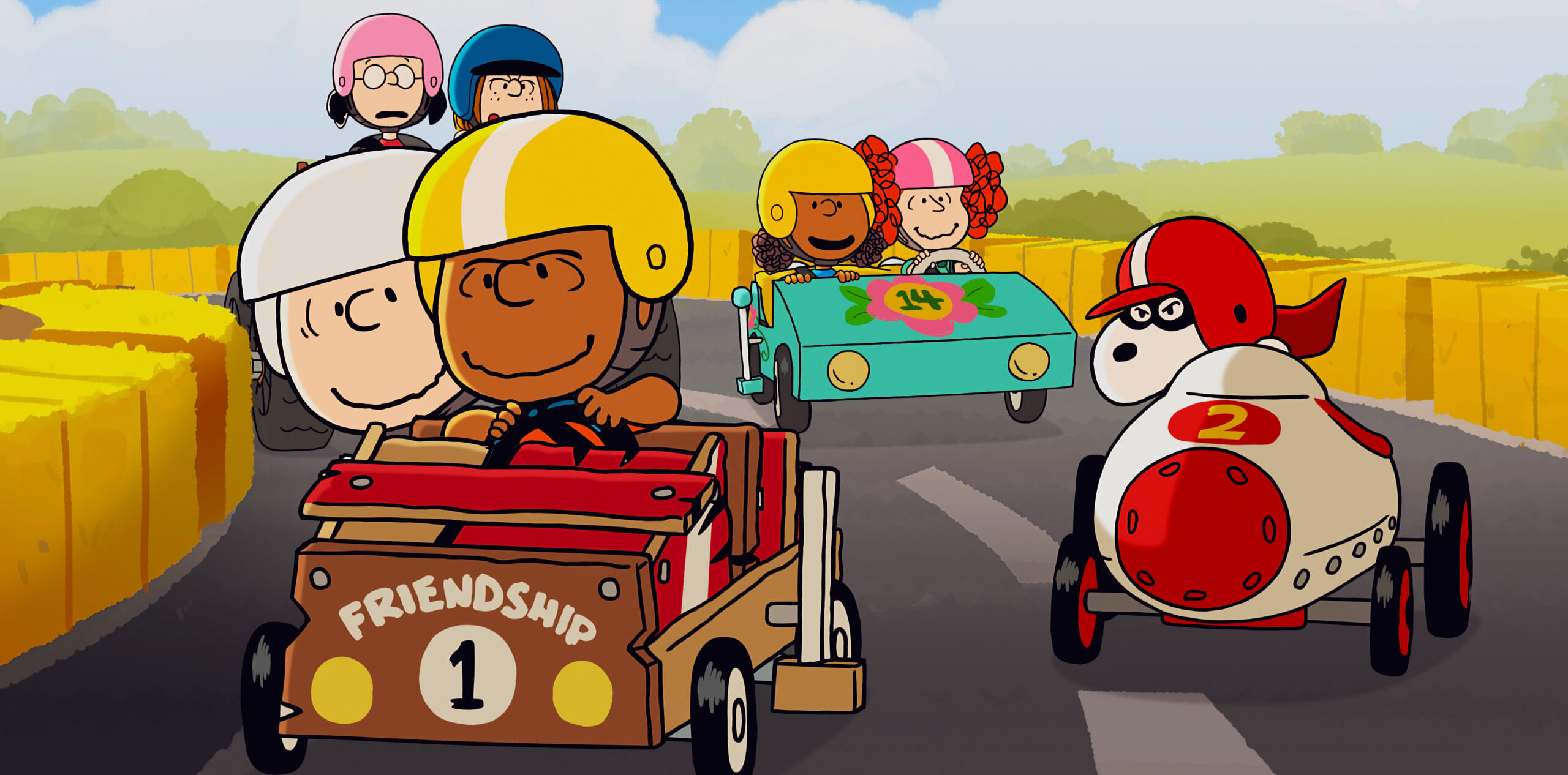
The Peanuts Gang in “Snoopy Presents: Welcome Home, Franklin,” premiering February 16, 2024 on Apple TV+.
RAYMOND S. PERSI: That moment was really important too because it was the first time we get to see Franklin not being perfect. He’s always trying so hard to be friendly and outgoing and everything. And he finally lets his frustration out on Charlie Brown. And that’s real!
We’re not perfect people. We get frustrated, we get angry, we make mistakes. And it’s a great opportunity for him to learn the lesson that Charlie Brown teaches him. Which is, and ‘That’s okay. We accept that because we’re friends, things aren’t perfect.’
We can be mad. And it’s temporary. What’s lasting longer is our friendship, our connection.
ROBB ARMSTRONG: Yeah. We could do 45 minutes. It’s a great point you’re bringing up. We could be talking about this for an hour.
I actually, I have to confess, I was very jarred watching that scene.
I did not create that scene that was more Brian and Neil coming up with that moment. And I thought it was too hard. Whenever you’re writing a teleplay or a movie, you establish what each character wants. And then as they pursue their want, they hit a wall.
Doesn’t matter whether it’s an action movie, science fiction, anything, they have to encounter it. Boom!
And this moment has to be defined by an emotional low point. Something has to happen. So I actually thought that the low point was too low. Like I thought that Franklin and Charlie Brown had encountered something and were reacting in a way that you’d never seen in any Peanuts special.
And I actually bristled against it, but I’m glad those guys beat me up and won. (laughs) ‘Cause you’re right, you see that, you learn something as a grown man that what were you trying to do?
You trying to get through this whole thing unscathed? Do you care about me or not? If so, let’s figure out how to keep moving forward. We hit a wall, let’s get through it.
It’s amazing. It’s an amazing moment. So thanks for winning. Thanks Craig! Thank you. Tell your son, thank you. They beat me up.
I was thinking this is a lot guys. These are little kids watching this. This is a lot but they were right.
RAYMOND S. PERSI: Kids have those experiences, so that’s great.
ROBB ARMSTRONG: Yeah, absolutely.
CRAIG SCHULZ: Well and the rebound is almost instantaneous. I mean, after that breakup you see them come back at night with the flashlights and they bond again.
So it’s not like you’re not in that moment very long. But Brian is all about emotion with Charlie Brown.
RAYMOND S. PERSI: And Charlie Brown knows I’m mad now I’m gonna go away so I can think about it. Calm down and then I’m gonna come back. And he teaches Franklin that too.
Yeah, it’s like, that’s what friends do. It’s okay to get mad sometimes.
THE NATURAL ARISTOCRAT: The music in this film was excellent. The composer was the right choice, it was so classy throughout.
RAYMOND S. PERSI: Thank you! That was Jeff Morrow. He’s been the composer for all these specials.
And I agree for this one because Franklin has this more sophisticated taste in music and he likes Coltrane and stuff. He worked harder to make the score.
Even though it’s still jazz, like always, it’s a little bit more sophisticated jazz. The kind of jazz that jazz players listen to. And I love that he could do that!
THE NATURAL ARISTOCRAT: Thanks guys!
SCHULZ, ARMSTRONG, PERSI: Thank you!
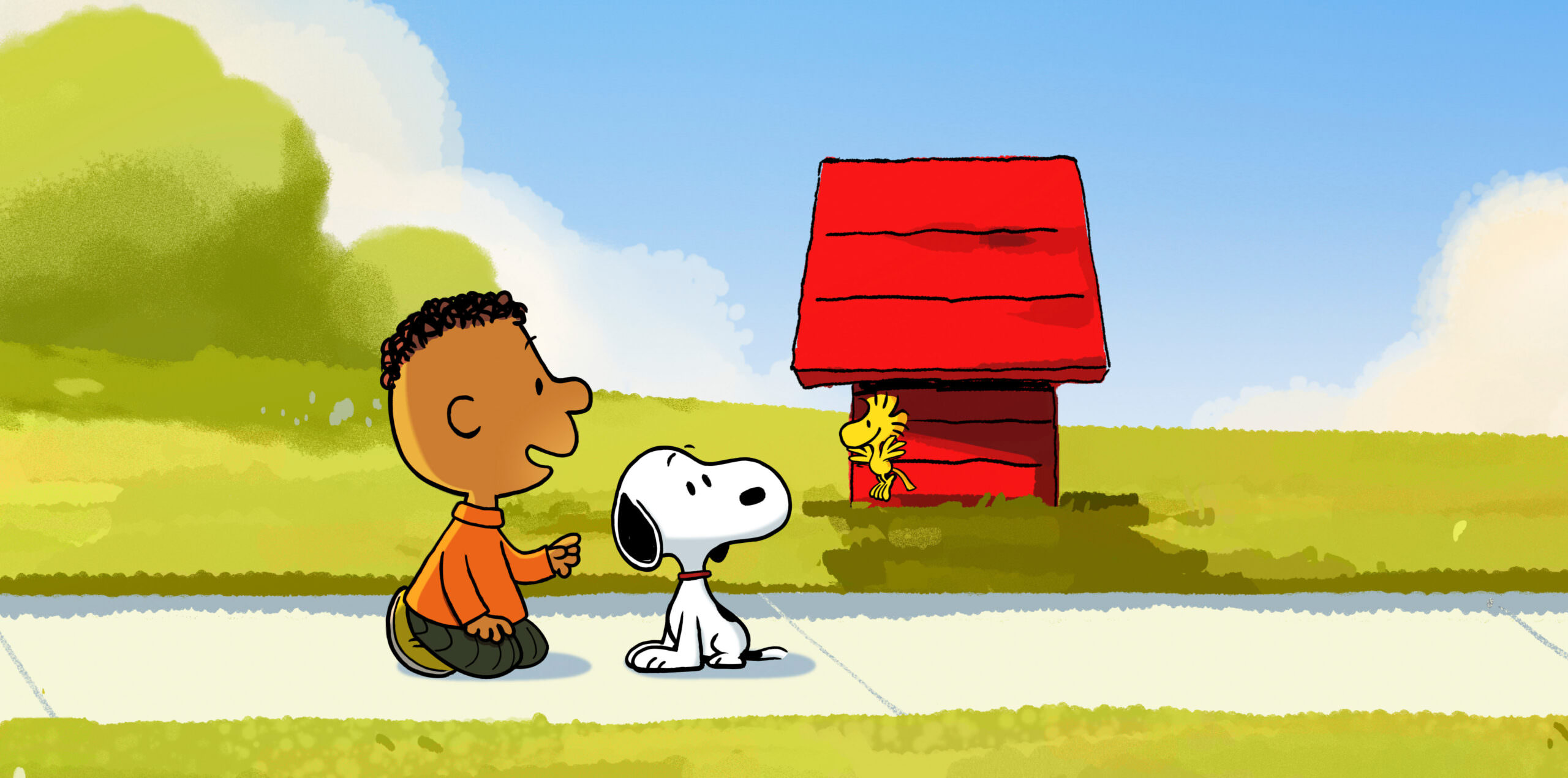
Franklin Armstrong, Snoopy and Woodstock in “Snoopy Presents: Welcome Home, Franklin,” premiering February 16, 2024 on Apple TV+.
Be sure to check out:
– ‘CURSES!’ Interview: Creators Jim Cooper, Jeff Dixon (Video)
– Dave Willis, Matt Maiellaro Interview: ATHF Season 12
– Wizards: Tales of Arcadia executive producers Quandt, Waltke talk Ending (Interview)
Visit the Animation section for more exclusive interviews, reviews, recaps, and breaking news and on-site event coverage you won’t get anywhere else!
Nir Regev is the founder of The Natural Aristocrat. You can directly contact him at [email protected] for coverage consideration, interview opportunities, or general comments.



‘Creepy Nuts’ Video Interview: Call of the Night Theme Songs
![Gakuryū Ishii Interview: The Box Man movie at Japan Society. Photo Credit: © 2024 Nir Regev - The Natural Aristocrat® [TheNaturalAristocrat.com]](https://thenaturalaristocrat.com/wp-content/uploads/2024/08/gakuryu-ishii-interview-the-box-man-movie-the-natural-aristocrat-photo-by-nir-regev-400x240.jpg)
![Gakuryū Ishii Interview: The Box Man movie at Japan Society. Photo Credit: © 2024 Nir Regev - The Natural Aristocrat® [TheNaturalAristocrat.com]](https://thenaturalaristocrat.com/wp-content/uploads/2024/08/gakuryu-ishii-interview-the-box-man-movie-the-natural-aristocrat-photo-by-nir-regev-80x80.jpg)
Gakuryū Ishii Interview: The Box Man movie at Japan Society


Fantasia 2024 Interview: KIZUMONOGATARI -Koyomi Vamp- Director, Producer (Video)
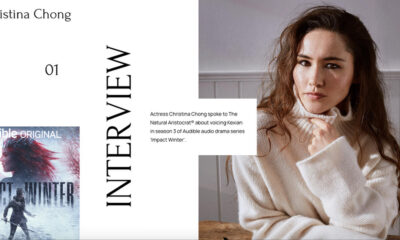

Christina Chong Interview: Kexian in Impact Winter Season 3


‘Man with a Mission’ NYC Interview: Jean-Ken Johnny at Irving Plaza (Video)
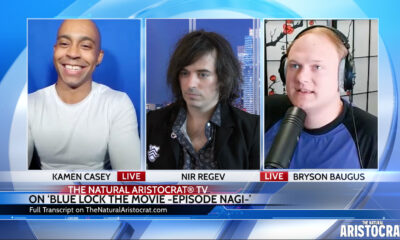

Video Interview: Blue Lock Movie English Dub Cast for Nagi, Reo
The Natural Aristocrat







